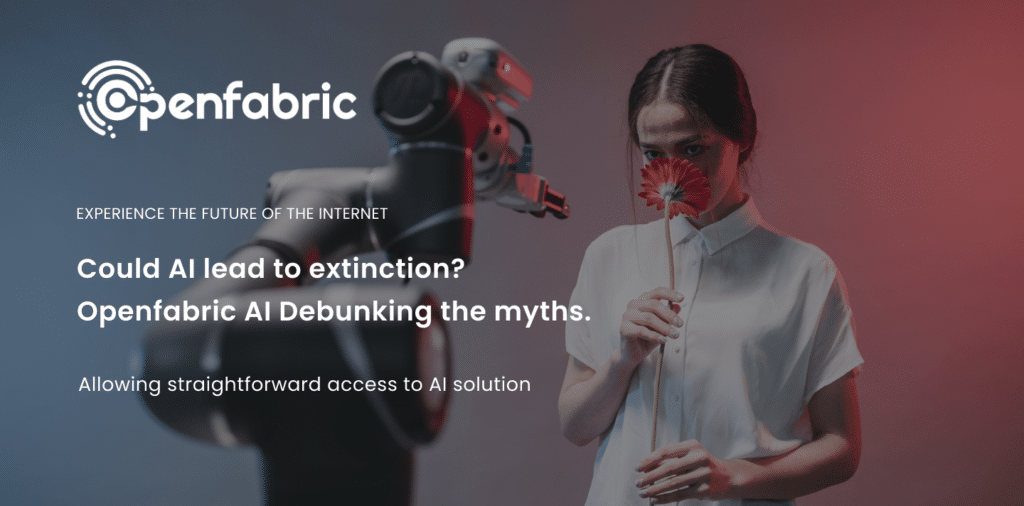
June 7, 2023 3 minutes read
Could AI lead to extinction? Openfabric AI Debunking the myths

In a recent open letter, some of the brightest minds in AI, including industry leaders like Sam Altman of OpenAI and Demis Hassabis of Google DeepMind, expressed their concerns about the rapid advancement of artificial intelligence. While their worries are understandable, it’s crucial to approach this topic constructively and shed light on the positive potential of AI rather than dwelling solely on the perceived risks. It may take more work to accept that the science fiction apocalypse depicted in Hollywood movies could become a reality. The notion that advancing computer technology could surpass human control and potentially lead to our destruction is unsettling. Instead of succumbing to fear, let’s explore how AI can enhance our lives and drive us toward a brighter future.
It’s no secret that AI has revolutionized various domains, bringing about academic achievements, improved work performance, elevated income levels, enhanced creativity, and overall physical well-being. The positive impacts of AI are far-reaching, extending our learning capacity, managing complex tasks, and even excelling in leadership roles and entrepreneurial endeavors. With AI’s assistance, we have witnessed advancements in, reading comprehension, financial decision-making, and gaining a deeper understanding of diverse perspectives. Moreover, AI has breathed new life into creative arts, parenting, medicines and overall life satisfaction.
Throughout history, human intelligence has catalyzed remarkable progress in science, technology, mathematics, medicine, and more. By harnessing our intellectual capabilities, we’ve propelled ourselves from basic subsistence farming to a civilization that thrives on scientific discoveries, technological innovations, and cultural achievements. It’s essential to recognize that AI is an extension of human intelligence, offering unprecedented opportunities to augment our abilities and tackle complex global challenges.
To address concerns about the potential risks associated with AI, Openfabric AI, led by CEO Andrei Tara, is committed to democratizing AI and ensuring the well-being of humanity. Tara believes that AI can be a force for good, revolutionizing numerous domains and leading us toward a future where we can overcome pressing issues like climate change. Openfabric AI’s mission aligns with these aspirations, seeking to make AI accessible to all while carefully considering the potential challenges that come with it.
The rise of AI, exemplified by systems like ChatGPT and Google, allows us to accelerate the augmentation of human intelligence and explore uncharted territories of possibility. Embracing this progress means breaking free from the centralized control of technology, where access to powerful tools is limited to a select few. Like the two most famous campaign slogans “Power to the people, and yes we can,” Openfabric AI aims to address these challenges and democratize AI and Web3 applications, ensuring that AI’s power is in the people’s hands. As we navigate the future of AI, it’s essential to approach the topic with optimism and a proactive mindset. By making thoughtful decisions, we can shape a destiny that benefits the current and future generations.
As I wrap up this article, I want you to imagine a world where AI is a catalyst for positive change and a driving force behind human progress. Are you seeing the bigger pictures and endless possibilities? Now, let us embrace this potential and work together to build a future where AI leads us toward new frontiers of prosperity and well-being.

